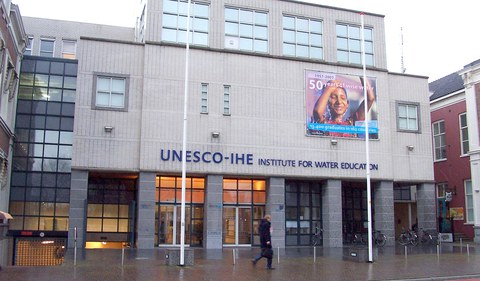Apr 30, 2016
Research stay of Aybulat Fatkhutdinov at the UNESCO Institute for Water Education (IHE)

UNESCO-IHE building
Within the INOWAS qualification program, Aybulat Fatkhutdinov visited between 3-30 April 2016 the UNESCO Institute for Water Education (UNESCO-IHE) in Delft, The Netherlands. The main objective of the visit was conducting a collaborative research on the topic of development of the web based decision support systems for groundwater management applications.
The specific aim of the work included the development of a data driven modeling web tool for short and long term predictions of the groundwater balance on the local scale. The applied modeling methods included various machine learning algorithms that were trained on the available global meteorological and other environmental datasets. The datasets included both historical climate reanalysis data that together with groundwater observations of interest were used for training the model and future climate projections that were used for predictions. The historical climate used in the model was the “ERA Interim/land” dataset produced by the ECMWF (European Centre for Medium Range Weather Forecast) with various temporal and spatial resolutions. For the future climate projections, the “ECHAM5” global general atmospheric circulation model was used. The applied learning methods included support vector machines (SVR, SVC), classification trees, linear and non-linear regressions. The implemented software infrastructure includes data storage, processing and user interface components. The data storage has been implemented with the “Rasdaman” database management system, which allows to efficiently store and access large spatio-temporal datasets. The processing components was written on the Python programming language complemented by the “SciKit Learn” library - a python implementation of a large number of machine learning algorithms. The client – server interface was built using “PyWPS” – a python implementation of the Web Processing Service (WPS) standard.
By the end of the visit a draft version of the application was deployed on the institute's local server and tested on several real world applications.
